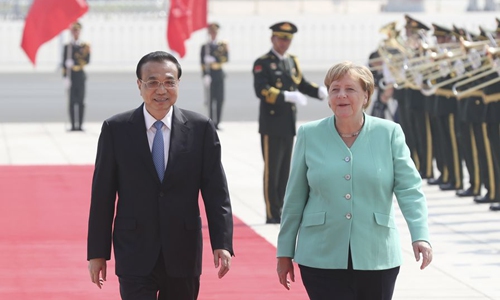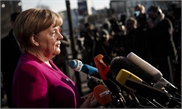
Chinese Premier Li Keqiang holds a welcome ceremony for visiting German Chancellor Angela Merkel before their talks in Beijing, capital of China, Sept. 6, 2019. (Xinhua/Yao Dawei)
Chinese Premier Li Keqiang and German Chancellor Angela Merkel will hold talks via video link on Thursday, according to China's Foreign Ministry, a move experts said could inject much-needed stability and confidence in the global economy that has been thrown into disarray by US unilateralism.
The virtual talks will focus on bilateral ties, China-EU relationship, and international anti-COVID-19 cooperation, among other topics.
It will also explore pragmatic cooperation between the two countries in varied areas, in hopes of making more progress in China-Germany relations, Hua Chunying, spokesperson for the Ministry of Foreign Affairs, told reporters on Wednesday.
Both countries are pushing for the coronavirus' containment, economic and social development, and resuming work and production. They're pressing the "restart" and "fast forward" buttons, Hua said, adding all these efforts would help to stabilize global supply chains and pull the world economy out of recession.
The virtual talks follow a telephone conversation between Chinese President Xi Jinping and Merkel last week.
China stands ready to work with Germany and the EU to strengthen strategic cooperation, uphold multilateralism, tackle global challenges, and jointly inject certainty to the current world of uncertainty, Xi said in the third such phone conversation with Merkel since the onset of the COVID-19 outbreak, according to the Xinhua News Agency.
Both economies have taken a hit from the pandemic, so they're prioritizing economic revival efforts where there is substantial potential for cooperation, Ruan Zongze, executive vice president of the China Institute of International Studies, told the Global Times on Wednesday.
China-Germany trade accounts for about 40 percent of China's trade with the EU, so forging closer economic ties between the two countries is more pressing than ever, Ruan said.
Europe was the epicenter of the pandemic before being overtaken by the US. The European economy has accordingly taken a battering from the deadly disease.
Chinese customs data showed that the Association of Southeast Asian Nations unseated the EU as China's top trading partner in the first five months of the year.
In a sign of bilateral closeness, two chartered flights have flown management professionals of German firms back to China, the first such flights to take foreign nationals from Europe back to China after the country contained the coronavirus outbreak.
The German Chamber of Commerce in China revealed to the Global Times on Friday that it expects more chartered flights to be arranged, without disclosing specifics. Many inquiries have been received in recent days about the next flight, according to the chamber.
With Germany scheduled to take over the EU's rotating presidency in July, the nation is intended to take greater responsibility for advancing the China-EU partnership, Ruan commented, saying that frequent high-level talks between China and Germany would stabilize global economic growth.
The Trump administration's "America First" push has fanned unilateralism and protectionism, dismaying investors hoping for inclusive growth resulting from multilateralism, he said, noting that a cooperative mindset shared by China and Germany on wide-ranging global issues such as the pandemic and climate change will provide a much-needed source of optimism amid coronavirus-induced uncertainty.
In a fresh sign of US-inflicted disruption to global trade, Trump threatened both the EU and China with more tariffs on Friday, in an attempt to intimidate the trading partners into reducing tariffs on US lobsters.
As Gao Lingyun, an expert at the Institute of World Economics and Politics under the Chinese Academy of Social Sciences, put it, the tariff intimidation is another effort by Trump to shift the blame for his administration's botched COVID-19 response, rising domestic racial strife and a struggling economy.

